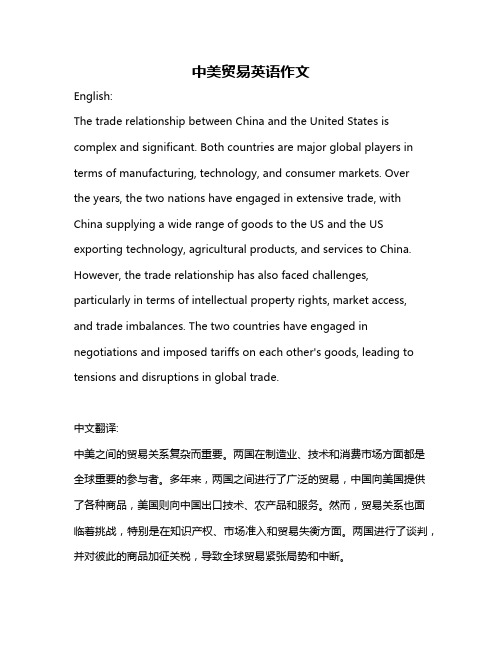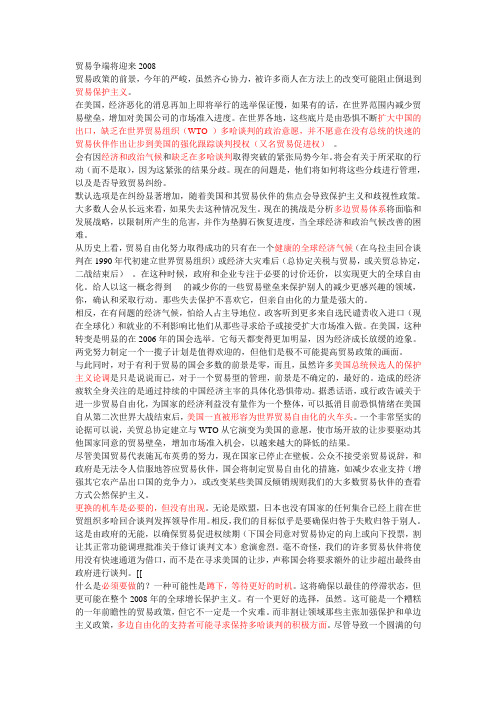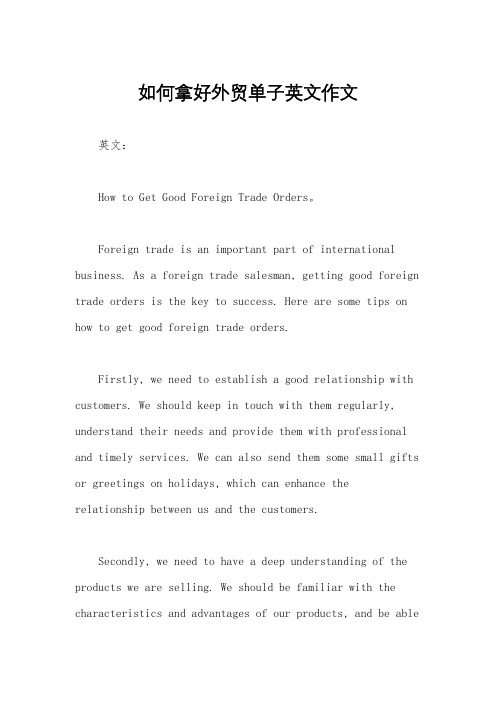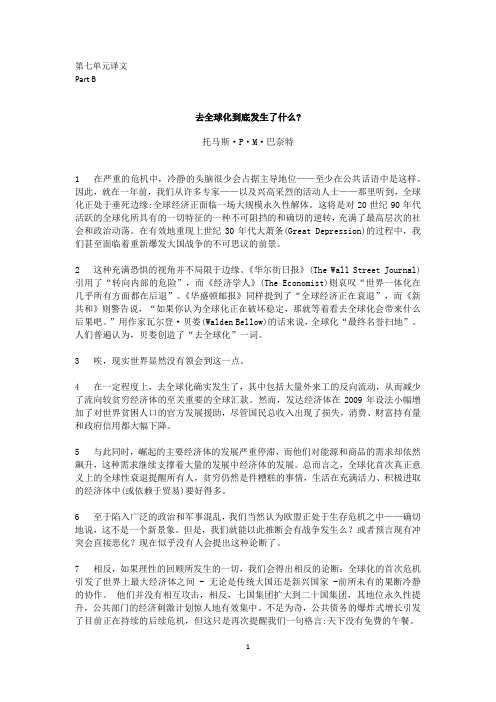贸易英语阅读文章
中美贸易英语作文

中美贸易英语作文English:The trade relationship between China and the United States is complex and significant. Both countries are major global players in terms of manufacturing, technology, and consumer markets. Overthe years, the two nations have engaged in extensive trade, with China supplying a wide range of goods to the US and the US exporting technology, agricultural products, and services to China. However, the trade relationship has also faced challenges, particularly in terms of intellectual property rights, market access,and trade imbalances. The two countries have engaged in negotiations and imposed tariffs on each other's goods, leading to tensions and disruptions in global trade.中文翻译:中美之间的贸易关系复杂而重要。
两国在制造业、技术和消费市场方面都是全球重要的参与者。
多年来,两国之间进行了广泛的贸易,中国向美国提供了各种商品,美国则向中国出口技术、农产品和服务。
然而,贸易关系也面临着挑战,特别是在知识产权、市场准入和贸易失衡方面。
商务英语阅读教程3UNIT3TradeDisputes

贸易争端将迎来2008贸易政策的前景,今年的严峻,虽然齐心协力,被许多商人在方法上的改变可能阻止倒退到贸易保护主义。
在美国,经济恶化的消息再加上即将举行的选举保证慢,如果有的话,在世界范围内减少贸易壁垒,增加对美国公司的市场准入进度。
在世界各地,这些底片是由恐惧不断扩大中国的出口,缺乏在世界贸易组织(WTO )多哈谈判的政治意愿,并不愿意在没有总统的快速的贸易伙伴作出让步到美国的强化跟踪谈判授权(又名贸易促进权)。
会有因经济和政治气候和缺乏在多哈谈判取得突破的紧张局势今年。
将会有关于所采取的行动(而不是取),因为这紧张的结果分歧。
现在的问题是,他们将如何将这些分歧进行管理,以及是否导致贸易纠纷。
默认选项是在纠纷显著增加,随着美国和其贸易伙伴的焦点会导致保护主义和歧视性政策。
大多数人会从长远来看,如果失去这种情况发生。
现在的挑战是分析多边贸易体系将面临和发展战略,以限制所产生的危害,并作为垫脚石恢复进度,当全球经济和政治气候改善的困难。
从历史上看,贸易自由化努力取得成功的只有在一个健康的全球经济气候(在乌拉圭回合谈判在1990年代初建立世界贸易组织)或经济大灾难后(总协定关税与贸易,或关贸总协定,二战结束后)。
在这种时候,政府和企业专注于必要的讨价还价,以实现更大的全球自由化。
给人以这一概念得到- 的减少你的一些贸易壁垒来保护别人的减少更感兴趣的领域,你,确认和采取行动。
那些失去保护不喜欢它,但亲自由化的力量是强大的。
相反,在有问题的经济气候,怕给人占主导地位。
政客听到更多来自选民谴责收入进口(现在全球化)和就业的不利影响比他们从那些寻求给予或接受扩大市场准入做。
在美国,这种转变是明显的在2006年的国会选举。
它每天都变得更加明显,因为经济成长放缓的迹象。
两党努力制定一个一揽子计划是值得欢迎的,但他们是极不可能提高贸易政策的画面。
与此同时,对于有利于贸易的国会多数的前景是零,而且,虽然许多美国总统候选人的保护主义论调是只是说说而已,对于一个贸易型的管理,前景是不确定的,最好的。
如何拿好外贸单子英文作文

如何拿好外贸单子英文作文英文:How to Get Good Foreign Trade Orders。
Foreign trade is an important part of international business. As a foreign trade salesman, getting good foreign trade orders is the key to success. Here are some tips on how to get good foreign trade orders.Firstly, we need to establish a good relationship with customers. We should keep in touch with them regularly, understand their needs and provide them with professional and timely services. We can also send them some small gifts or greetings on holidays, which can enhance therelationship between us and the customers.Secondly, we need to have a deep understanding of the products we are selling. We should be familiar with the characteristics and advantages of our products, and be ableto answer customers' questions in a timely and accurate manner. We can also provide customers with some product samples or catalogs, which can help them better understand our products.Thirdly, we need to participate in various exhibitions and trade fairs. These activities are good opportunities to showcase our products and get in touch with potential customers. We can also learn about the latest market trends and the needs of customers through these activities.Lastly, we need to be patient and persistent. Foreign trade orders are not easy to come by, and we need to be patient and persistent in our efforts. We should not give up easily, and continue to improve our skills and services to attract more customers.中文:如何拿好外贸单子。
高三国际贸易英语阅读理解30题

高三国际贸易英语阅读理解30题1<背景文章>International trade has a long and fascinating history. It dates back to ancient times when civilizations would exchange goods through land and sea routes. The Silk Road, for example, was a major trade route that connected the East and the West. Merchants would travel long distances to trade silk, spices, precious metals, and other valuable commodities.Over the centuries, international trade has evolved and expanded. The discovery of new lands and the development of shipping technologies led to an increase in global trade. The Industrial Revolution further transformed international trade by enabling mass production and improving transportation.Today, international trade plays a crucial role in the global economy. It allows countries to specialize in producing goods and services that they are most efficient at and to trade with other countries for the goods and services they need. This leads to increased productivity, lower prices, and a greater variety of products available to consumers.International trade also has a significant impact on employment and economic growth. It creates jobs in industries related to exports and imports, and it can stimulate economic development by bringing in foreigninvestment and technology. However, international trade also faces challenges such as trade barriers, currency fluctuations, and political instability.1. The Silk Road was mainly used for trading ______.A. books and papersB. silk and spicesC. machinery and equipmentD. food and drinks答案:B。
商务英语阅读 王艳 Chapter 4

2. Why does Japan need to embrace globalization? 3. How can Japanese firms go global?
Paragraph 1-8
1. Why is Japan such an outlier? 2. Why does Japan need to embrace globalization?
ቤተ መጻሕፍቲ ባይዱ
企业重组
外包 核心竞争力 放宽管制 私募股权投资
10. Specialization To restrict someone’s economic activities to some certain fields 专门化
Economic globalization
1. The term “economic globalization” is now being used with increasing frequency in newspapers, magazines, seminars and international conferences. 2. The basic feature is free flow of commodity, capital, technology, service, and information in the global context for optimized allocation.
3.Economic globalization is giving new impetus and providing opportunities to world economic development and meanwhile making the various economies more and more interdependent and interactive.
《新交际英语阅读教程4》参考译文U7 Economy and Trade 文章翻译

第七单元译文Part B去全球化到底发生了什么?托马斯·P·M·巴奈特1 在严重的危机中,冷静的头脑很少会占据主导地位——至少在公共话语中是这样。
因此,就在一年前,我们从许多专家——以及兴高采烈的活动人士——那里听到,全球化正处于垂死边缘:全球经济正面临一场大规模永久性解体。
这将是对20世纪90年代活跃的全球化所具有的一切特征的一种不可阻挡的和确切的逆转,充满了最高层次的社会和政治动荡。
在有效地重现上世纪30年代大萧条(Great Depression)的过程中,我们甚至面临着重新爆发大国战争的不可思议的前景。
2 这种充满恐惧的视角并不局限于边缘。
《华尔街日报》(The Wall Street Journal)引用了“转向内部的危险”,而《经济学人》(The Economist)则哀叹“世界一体化在几乎所有方面都在后退”。
《华盛顿邮报》同样提到了“全球经济正在衰退”,而《新共和》则警告说,“如果你认为全球化正在破坏稳定,那就等着看去全球化会带来什么后果吧。
”用作家瓦尔登·贝娄(Walden Bellow)的话来说,全球化“最终名誉扫地”。
人们普遍认为,贝娄创造了“去全球化”一词。
3 唉,现实世界显然没有领会到这一点。
4 在一定程度上,去全球化确实发生了,其中包括大量外来工的反向流动,从而减少了流向较贫穷经济体的至关重要的全球汇款。
然而,发达经济体在2009年设法小幅增加了对世界贫困人口的官方发展援助,尽管国民总收入出现了损失,消费、财富持有量和政府信用都大幅下降。
5 与此同时,崛起的主要经济体的发展严重停滞,而他们对能源和商品的需求却依然飙升,这种需求继续支撑着大量的发展中经济体的发展。
总而言之,全球化首次真正意义上的全球性衰退提醒所有人,贫穷仍然是件糟糕的事情,生活在充满活力、积极进取的经济体中(或依赖于贸易)要好得多。
6 至于陷入广泛的政治和军事混乱,我们当然认为欧盟正处于生存危机之中——确切地说,这不是一个新景象。
商务英语阅读_Unit 4国际贸易基础
Exclusive Sales Agreement The exporter may sign
an exclusive sales agreement with an importer abroad. He may also set up his own branch office and employ his own sales organization abroad. He may act through a subsidiary company which is established under the laws of the foreign country in question. Or, he may combine with other traders in a joint selling organization (or joint venture), a consortium or an export group. Agency Arrangements The exporter enters into direct relations with the customers abroad, by means of a contract procured and conducted on behalf of the exporter by a representative who resides abroad and is not his employee. The remuneration of the representative or independent agent is usually based upon a commission on the purchase price of the exports.
关于外贸的英语作文
关于外贸的英语作文Title: Exploring the Dynamics of International Trade。
In today's globalized world, international trade playsa pivotal role in driving economic growth, fostering international relations, and promoting cultural exchange.As we delve into the intricacies of foreign trade, it becomes evident that it is not merely about the exchange of goods and services across borders but also about navigating through a complex web of policies, market dynamics, and cultural nuances.First and foremost, understanding the fundamentals of international trade is crucial. At its core, international trade involves the exchange of goods and services between countries, driven by the principle of comparative advantage. This principle posits that countries should specialize in producing goods and services in which they have a lower opportunity cost and trade with other nations to obtain goods and services that they cannot efficiently producedomestically.Moreover, the dynamics of international trade areheavily influenced by governmental policies and regulations. Tariffs, quotas, subsidies, and trade agreements are among the myriad of tools used by governments to either promoteor restrict trade. For instance, tariffs, which are taxes imposed on imported goods, can either serve as a source of revenue for the government or as a means to protectdomestic industries from foreign competition. On the other hand, trade agreements such as free trade agreements aim to eliminate barriers to trade and facilitate the flow ofgoods and services between participating countries.Furthermore, the competitive landscape of international trade is shaped by various market forces. Factors such as supply and demand, currency exchange rates, inflation, and technological advancements all influence thecompetitiveness of countries in the global market. For instance, a country with a highly skilled workforce and advanced technology may have a comparative advantage in producing high-tech goods, while a country with abundantnatural resources may excel in agricultural or mineral exports.Cultural differences also play a significant role in shaping international trade relations. Effective communication, understanding cultural norms, and building trust are essential components of successful cross-border business transactions. Cultural sensitivity andadaptability are key attributes for businesses operating in diverse international markets.Moreover, the advent of e-commerce and digital technologies has revolutionized the landscape of international trade. Online platforms and digital marketplaces have enabled businesses of all sizes to engage in global trade more easily and cost-effectively. E-commerce giants such as Alibaba, Amazon, and eBay have expanded access to international markets for small and medium-sized enterprises, leveling the playing field and fostering greater competition.In conclusion, international trade is a multifacetedphenomenon that encompasses economic, political, social, and cultural dimensions. Navigating through the complexities of foreign trade requires a deep understanding of its underlying principles, as well as an awareness of the diverse factors that influence trade dynamics. By fostering cooperation, embracing innovation, and promoting inclusivity, we can harness the power of international trade to drive sustainable economic development and foster greater global prosperity.。
商贸英语作文模板
商贸英语作文模板英文回答:Introduction。
International trade is a vital component of the global economy. It enables countries to specialize in the production of goods and services that they have a comparative advantage in, and to import goods and services that they cannot produce themselves. This leads toincreased efficiency, lower prices, and greater variety of goods and services for consumers.There are many different types of international trade, including trade in goods, services, and capital. Goodstrade involves the physical exchange of goods between countries. Services trade involves the provision ofservices from one country to another. Capital tradeinvolves the movement of financial assets between countries.Benefits of International Trade。
There are many benefits to international trade, including:Increased efficiency: International trade allows countries to specialize in the production of goods and services that they have a comparative advantage in. This leads to increased efficiency, as countries can produce more goods and services with the same resources.Lower prices: International trade can lead to lower prices for consumers. When countries can import goods and services from other countries, they do not have to produce those goods and services themselves, which can lead to lower production costs and lower prices for consumers.Greater variety of goods and services: International trade gives consumers access to a wider variety of goods and services. When countries can import goods and services from other countries, they do not have to rely on domestic production, which can lead to a greater variety of goodsand services for consumers.Challenges of International Trade。
外经贸英语阅读与翻译1
1.1.3 the Enviroment of International Trade
1.Political enviroment --openly court foreign companies/encourage --openly investments/offer reduced taxes or other investment incentives --impose strict regulations --impose --political stability --political --self-sufficiency:a shortage of products/the --selfoverall lower quality of life
As an entrepot, we handle a large volume of reentrepot, reexports.
此外,香港也是个转口港,处理大量转口贸易。
Hong Kong is the most important entrepot for trade between the EU and the Mainland.
香港是欧盟和中国内地之间最重要的转口港。
General Agreement on Trade in Services GATS 服务贸易总协定 Agreement on Trade Related Aspects of Intelletual Property Rights TRIPs 与贸易有关的知识产权协定
1.2.2 Important Terms about International Trade
Favorable balance of trade/ Unfavorable balance of trade: trade surplus/trade deficit Gerneral trade system/Specific trade system the country territory/the customs territory the bonded warehouse/free trade zone Value of international trade/ quantum of international trade the sum of the exports based on FOB prices of all nations within a certain period
- 1、下载文档前请自行甄别文档内容的完整性,平台不提供额外的编辑、内容补充、找答案等附加服务。
- 2、"仅部分预览"的文档,不可在线预览部分如存在完整性等问题,可反馈申请退款(可完整预览的文档不适用该条件!)。
- 3、如文档侵犯您的权益,请联系客服反馈,我们会尽快为您处理(人工客服工作时间:9:00-18:30)。
贸易英语阅读文章贸易是人类进行商品和服务交易的重要方式,同时也是推动人类社会前进和经济发展的核心驱动力。
下面是店铺带来的贸易英语阅读文章,欢迎阅读!贸易英语阅读文章1欧元区经济经受住英国脱欧首轮冲击The eurozone’s slow economic recovery appears to have weathered the initial shock ofBritain’s vote to leave the EU with a closely watched survey of business activity reaching itshighest level in seven months.欧元区缓慢的经济复苏似乎经受住了英国脱欧公投的首轮冲击,一项备受关注的调查显示,欧元区商业活动达到了7个月来最高水平。
The purchasing managers’ index — which measures orders, production and deliveries to providea snapshot of corporate health — rose in August to 53.3 from 53.2 in July; a reading above 50signals economic expansion.8月份采购经理人指数(PMI)升至53.3,7月为53.2。
该指数衡量订单、生产和交货情况,提供了企业健康概况,50以上表示经济扩张。
Coupled with a rise in a separate eurozone economic sentiment indicator, published by theEuropean Commission, the data are the latest to confound expectations of a sharp drop-offfollowing the Brexit vote.同时欧盟委员会(European Commission)发布的欧元区经济信心指标也出现上升。
这些数据是一个最新证据,证明英国脱欧公投后经济急剧下降的预期是错的。
The figures tally with bank lending surveys and other confidence indicators indicating thereferendum has had little impact so far on the eurozone economy.上述数据与银行贷款调查和其他信心指数相符,这些调查和信心指数表明公投到目前为止对欧元区经济几乎没有影响。
Even in Britain itself, data have been mixed. Some measures, including PMIs, point to a rapidslowdown in activity, while others, such as consumer spending, show little change. The trendcontinued yesterday with UK government data showing that sales of commercial propertieshad fallen sharply in July but residential sales held steady.即使对英国本身来说,数据也有好有坏。
包括PMI在内的部分指标指向经济活动快速放缓,而消费者支出等其他指标则显示变化不大。
昨日英国官方数据也显示7月份商业地产销售大幅下滑,但住宅销售保持稳定。
贸易英语阅读文章2Protectionism Doesn't PayThe global financial crisis is no doubt a catalyst for trade protectionism. As the world economy deteriorates, some countries try to boost growth prospects by erecting trade barriers. China calls on these governments not to replay history and revert to protectionism and economic isolationism.Previous global economic crises were usually accompanied by frequent trade disputes. The United States' erection of large-scale tariffs in 1930, for example, triggered a retaliatory global trade war. During the two oil shocks in the 1970s and 1980s, trade frictions emerged when major economies attempted to increase exports by depreciating their currencies. And in the wake of the 1997 Asian financial crisis, there was a notable uptick in antidumping actions, countervailing duties and other protectionist measures.The financial crisis is now spilling over into the real economy, hitting sectors like manufacturing and services. In almost all countries, factories are closing and unemployment is rising,creating political pressure and social problems. More and more governments are strengthening intervention in their economies under the excuse of 'economic security' and protecting vulnerable domestic industries to curb imports from other countries, especially those in emerging markets.Trade protectionism differs from legally acceptable measures to protect trade. It is an abuse of remedies provided by multilateral trade rules. This kind of protectionism is morphing into more complex and disguised forms, ranging from conventional tariff and nontariff barriers to technical barriers to trade, industry standards and industry protectionism.With the economic crisis worsening, caution must be taken even in employing trade protection measures consistent with World Trade Organization rules. At the Group of 20 Financial Summit in November 2008, world leaders called for countries to resist trade protectionism and committed themselves to refraining from erecting new barriers to trade and investment, a message strongly echoed by the Asia-Pacific Economic Cooperation summit at the end of last year, and the World Economic Forum held in Davos last month.History tells us that trade protection measures hurt not only other countries, but eventually the country that erected that trade barrier in the first place.To counter the Great Depression, the U.S. adopted the Smoot-Hawley Act in 1930, which raised import duties of over 20,000 foreign products significantly and provoked protectionist retaliation from other countries. Faced with that crisis, other countries pursued beggar-thy-neighbor policies that slashed global trade volumes from $36 billion in 1929 to $12 billion in 1932. Among the victims, not the least was the U.S. itself, whereexports shrank from $5.2 billion in 1929 to $1.2 billion in 1932. Even in the U.S., the Smoot-Hawley Act was widely believed to be a catalyst that aggravated the effects of Great Depression.Global trade is now in dire straits. Thanks to shrinking external demand caused by the economic crisis, major trading countries have seen their export growth tumble or have suffered huge contractions. Germany's exports dropped 10.6% in November 2008, compared to the same period the prior year -- the highest one-month drop since 1990. China also experienced negative export growth in November, and a 17.5% decline last month, when compared to the prior year. Protectionist policies would make things even worse and the consequences would be hard to predict.In the heat of the crisis, it's critical that all countries refrain from pointing fingers at each other or pursuing their own interests at the expense of others. The financial crisis reflects a chronic illness resulting from global economic structural imbalance and financial risk accumulation, and there is no quick fix to this malady. The fundamental interest of every country is to step up consultation and cooperation and keep international trade smoothly flowing. Healthy international trade can help revive the world economy. During the Great Depression, the U.S. recovered from its economic woes because the Franklin D. Roosevelt administration implemented the New Deal and shunned protectionism.Today's unprecedented financial crisis has inflicted a severe impact on China and other countries as well. China's economic growth has slowed, exports have plunged and unemployment pressure has mounted. Yet even so, China still firmly believes that trade protectionism isn't a solution to the world's problems. In2008, amid a contraction in global trade, China imported $1.133 trillion worth of goods from countries around the world -- an 18.5% increase over the prior year. These imports are boosting the economic development of China's trading partners. Since the crisis broke out, the Chinese government has decisively put forward a series of measures aiming at stimulating domestic demand. Given the size and openness of our country, the growth in China's domestic markets can be translated into greater market potential and investment opportunities for other countries. This year China will continue to increase imports and send buying missions abroad for large-scale purchase of equipment, products and technology.China has always championed our mutually beneficial opening-up policy and advocated international economic cooperation. We maintain that the Doha Round of global trade negotiations should be taken forward in a way that meets the interests of members and complies with the multilateral trading system already established. China is ready to stand together with all nations in the world to face up to the challenges of today, tackle the financial crisis through cooperation and guide the world economy into a new period of prosperity.贸易保护主义无法拯救世界经济对贸易保护主义来说,全球金融危机无疑是一针催化剂。
